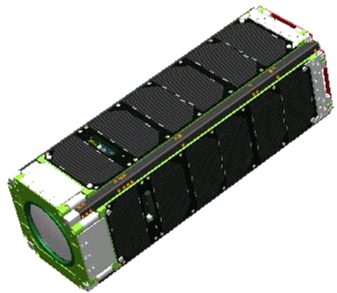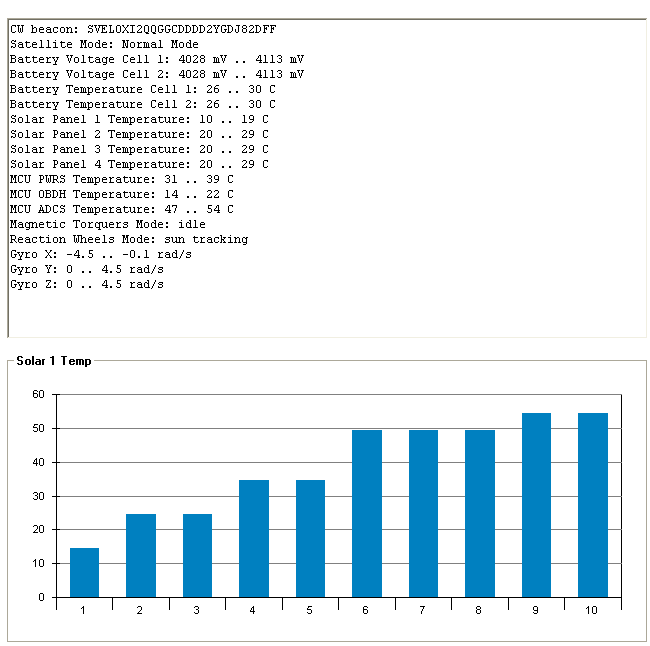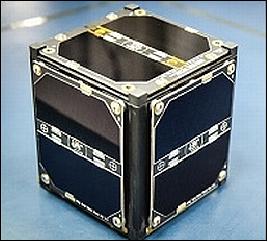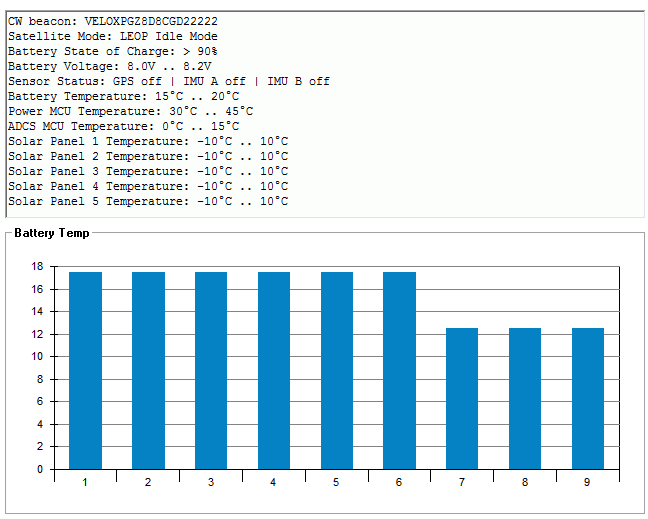VELOX I
Nanyang Technological University

VELOX-I is the first Singapore nanosatellite to operate in Low Earth’s Orbit (LEO). It is part of NTU’s Undergraduate Satellite Program, which provides an opportunity for engineering students to participate in a multidisciplinary hands-on space project. Besides educational objective, VELOX-I also contributes to the nanosatellite research with its technology demonstration and scientific payloads.
NASA-Catalog: 40057
Downlink
145.980 MHZ CW beacon
Call
VELOXP
Status
INACTIVE
Orbital Parameter
NORAD 40057 COSPAR designator 2014-034-E Inclination 98.249 RA of A. Node 305.916 Eccentricity 0.0013449 Argument of Perigee 101.412 Revs per day 14.74068384 Period 1h 37m 41s (97.68 min) Semi-major axis 7 026 km Perigee x Apogee 639 x 658 km BStar (drag term) 0.000178070 1/ER Mean anomaly 258.860
Mission Objectives
- to launch the first Singapore’s nanosatellite VELOX-I, which is designed, built, and operated by students from different schools in the College of Engineering, NTU.
- to acquire images of Earth and transmit them back to ground station. A narrow angle camera with tele-optics is used to provide high-resolution images of Earth from LEO.
- to carry out experiments relevant to technology demonstration.Payloads include: a vision system, a dual-FOV sun sensor.
- to piggyback launch a picosatellite (VELOX-PIII) for intersatellite communication experiment.
Telemetry
sveloxi 2qqggcdddd2ygdj82dff sveloxi 2qqggdfdfd2ygdj82ddd sveloxi 2qqggdfffd2ygdja2fdf sveloxi 2qqggfgfgd2ygdja2dfd sveloxi 2qqggfgfgd2ygdja2fff sveloxi 2qqggggggd2ygdja2dfd sveloxi 2qqgggjgjd2ygdja2dff sveloxi 2qqgggjgjd2ygdja2dff sveloxi 2qqggjjjjd2ygdja2fff sveloxi 2qqggjjjjd2ygdja2ffd

Links und weitere Informationen
VELOX P-II
Nanyang Technological University

VELOX-PII (Picosatellite II) is the first CubeSat of SaRC (Satellite Research Center) at NTU (Nanyang Technological University), Singapore. VELOX-PII is a 1U CubeSat with a mass of 1.33 kg and dimensions of 10 cm x 10 cm x 11.35 cm. The CubeSat structure uses a hard anodized Al. 7075 chassis, with stainless steel load bearing parts.
The CubeSat is 3-axis stabilized. The ADCS (Attitude Determination and Control Subsystem) features 1 GPS receiver, 2 IMUs (Inertial Measurement Units), 1 dual-FOV sun sensor, 5 coarse sun sensors, and 3 magnetic torquers.
NASA-Catalog: 39438
Downlink
145.980 MHZ CW beacon
Call
VELOXP
Status
inactive
Orbital Parameter
NORAD 39438 COSPAR designator 2013-066-Y Inclination 97.766 RA of A. Node 304.167 Eccentricity 0.0074832 Argument of Perigee 22.042 Revs per day 14.75516180 Period 1h 37m 35s (97.58 min) Semi-major axis 7 022 km Perigee x Apogee 591 x 696 km BStar (drag term) 0.000107250 1/ER Mean anomaly 338.399
Telemetry
22:53 UTC veloxp gz8d8cgd22222 22:54 UTC veloxp gz8d8cgd22222 22:55 UTC veloxp gz8dqcgd22222 22:56 UTC veloxp gz8dqcgd22222 22:57 UTC veloxp gz8dqcgd22222 22:58 UTC veloxp gz8dqcgdf2222 22:59 UTC veloxp gz8dqcgdf2222 23:00 UTC veloxp gz8dqcgdf22ff 23:01 UTC veloxp gz8dqcgdf22ff 23:02 UTC veloxp gz8dqcgdff2ff G LEOP Idle Mode Z Battery State of Charge > 90% 8 Battery Voltage > 8.2 V C Battery Temp 0°C .. 5°C G ADCS Subsystem’s MCU Temperature 0°C .. 15 °C D - 2 Solar Panel 1 Temperature -30°C .. -10°C 2 Solar Panel 2 Temperature -30°C .. -10°C 2 Solar Panel 3 Temperature -30°C .. -10°C 2 Solar Panel 4 Temperature -30°C .. -10°C 2 Solar Panel 5 Temperature -30°C .. -10°C
22.11.2013 – first telemetry (DK3WN)

Links und weitere Informationen
https://directory.eoportal.org/web/eoportal/satellite-missions/v-w-x-y-z/velox-piihttp://www.sarc.eee.ntu.edu.sg/Research/Projects/Pages/VELOX-P.aspx
Launch
A Dnepr launch vehicle blasted off from the Dombarovsky Air Base, Orenburg Region, Russia, on November 21, 2013 at 7:10 UTC carrying a total of 32 spacecraft of different shapes and sizes to orbit. The launch was successful and all satellites were released into their desired orbits.